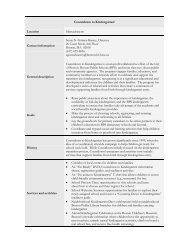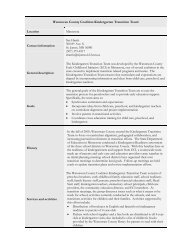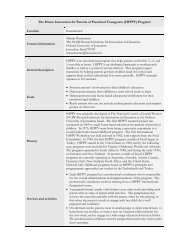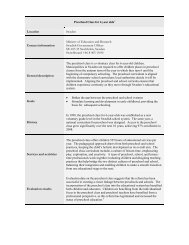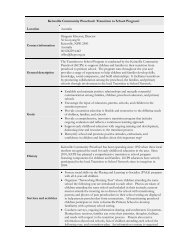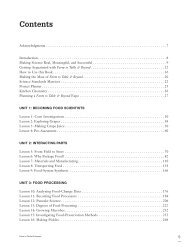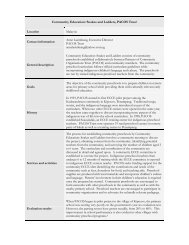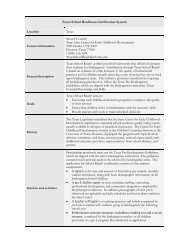Proceedings of the Fourth Annual Teachers College Educational ...
Proceedings of the Fourth Annual Teachers College Educational ...
Proceedings of the Fourth Annual Teachers College Educational ...
You also want an ePaper? Increase the reach of your titles
YUMPU automatically turns print PDFs into web optimized ePapers that Google loves.
Exploration <strong>of</strong> concepts to facilitate diverse knowledge practices and<br />
personal learning environments<br />
Sabine Reisas,<br />
University Kiel, Faculty <strong>of</strong> Arts and Humanities, Institute <strong>of</strong> <strong>Educational</strong> Sciences,<br />
Department <strong>of</strong> Media Pedagogy/<strong>Educational</strong> Computer Sciences,<br />
Olshausenstr. 75, D-24098 Kiel, Germany,<br />
Email: sreisas@av-studio.uni-kiel.de<br />
Abstract: Developing new course concepts in higher education, which facilitate students<br />
to analyze and reflect <strong>the</strong>ir existing knowledge practices, will be necessary to solve illstructured<br />
tasks in knowledge intensive areas (e.g. collaborative scenarios or developing<br />
interventions in educational settings). Therefore students are challenged to gain a wide<br />
repertoire <strong>of</strong> diverse knowledge practices to operate flexible and self-determined and to<br />
make <strong>the</strong>ir expedient contribution to <strong>the</strong> knowledge-based society. By considering <strong>the</strong><br />
needs and <strong>the</strong> existing personal learning environments <strong>of</strong> each student as a foundation,<br />
<strong>the</strong> author aims to develop a concept which will encourage students to assume<br />
responsibility for co-producing and negotiating new practices and refine <strong>the</strong>ir personal<br />
learning environments. The paper describes in which settings <strong>the</strong> research takes place<br />
and outlines a mixed-method approach to gain a deeper understanding <strong>of</strong> <strong>the</strong> implicit and<br />
explicit context conditions.<br />
In recent decades, due to technological changes, new trajectories are developing in knowledge intensive<br />
areas such as higher education. It is assumed that existing practices <strong>of</strong> knowledge workers are<br />
inadequate, so that <strong>the</strong>re is a need for addressing <strong>the</strong> emerging requirements such as working in<br />
interdisciplinary teams, continuous learning, flexibility, autonomy and responsibility for one`s own<br />
productivity (Drucker, 1999). This demands modifications <strong>of</strong> course concepts in higher education to allow<br />
students to develop a wide repertoire <strong>of</strong> diverse knowledge practices, which enable <strong>the</strong>m to act selfdetermined<br />
and adequately to increase <strong>the</strong> productivity in knowledge intensive areas. This is also<br />
Wenger`s (2008) intention who understands socially negotiated practices as a fundamental goal <strong>of</strong><br />
learning to foster students to make a contribution to knowledge society. Propositions from an earlier study<br />
(Reisas, Schaller, Allert, Richter & Lehmhaus, 2011) will be taken into account to investigate perceived<br />
discrepancies and <strong>the</strong>ir influence on common knowledge practices and Personal Learning Environments<br />
(PLEs) <strong>of</strong> students.<br />
The author understands PLEs as an approach to address <strong>the</strong> aforementioned requirements and to<br />
facilitate students to develop diverse knowledge practices. There are two different foci on PLEs: (a) a<br />
more technology-oriented view and a more pedagogical-focussed perspective (Buchem, Attwell & Torres,<br />
2011). This work conceives both perspectives as interwoven and understands PLEs as complex and<br />
dynamic activity systems (Yamagata-Lynch, 2010), which are intertwined in a social, cultural and material<br />
environment. It is assumed that a PLE and its interrelated components can be analyzed by <strong>the</strong> sociohistorical<br />
activity <strong>the</strong>ory framework by Engeström (Buchem, Attwell & Torres, 2011; Engeström, 2007).<br />
Hakkarainen (2009) stated that assemblages <strong>of</strong> human activity are knowledge practices, which have a<br />
social and an individual component. Based on Orlikowski (2007) “<strong>the</strong> social and <strong>the</strong> material are<br />
constitutively entangled”. Which means that materiality and social practices are mutually dependent and<br />
not only a cognitive aspect. The author understands that knowledge practices can`t be seen as separated<br />
from PLEs, because <strong>the</strong>re is an underlying element in consequence <strong>of</strong> socio-materiality and <strong>the</strong>refore<br />
PLEs are practice-oriented.<br />
We observed that <strong>the</strong> existing knowledge practices in seminar settings are <strong>of</strong> no advantages to students<br />
in order to dissolve ill-structured problems. They have nei<strong>the</strong>r a wide range <strong>of</strong> practices nor are <strong>the</strong>y able<br />
to challenge <strong>the</strong>ir common practices, especially in stressful situations students rely on existing repertoire<br />
<strong>of</strong> practices. For developing new concepts it is important to note that teaching and learning are based on<br />
intentions and expectations, which have an impact on existing knowledge practices and PLEs, because in<br />
each situation, practices are negotiated and socially constructed (Wenger, 2008). That’s why pedagogy<br />
54



